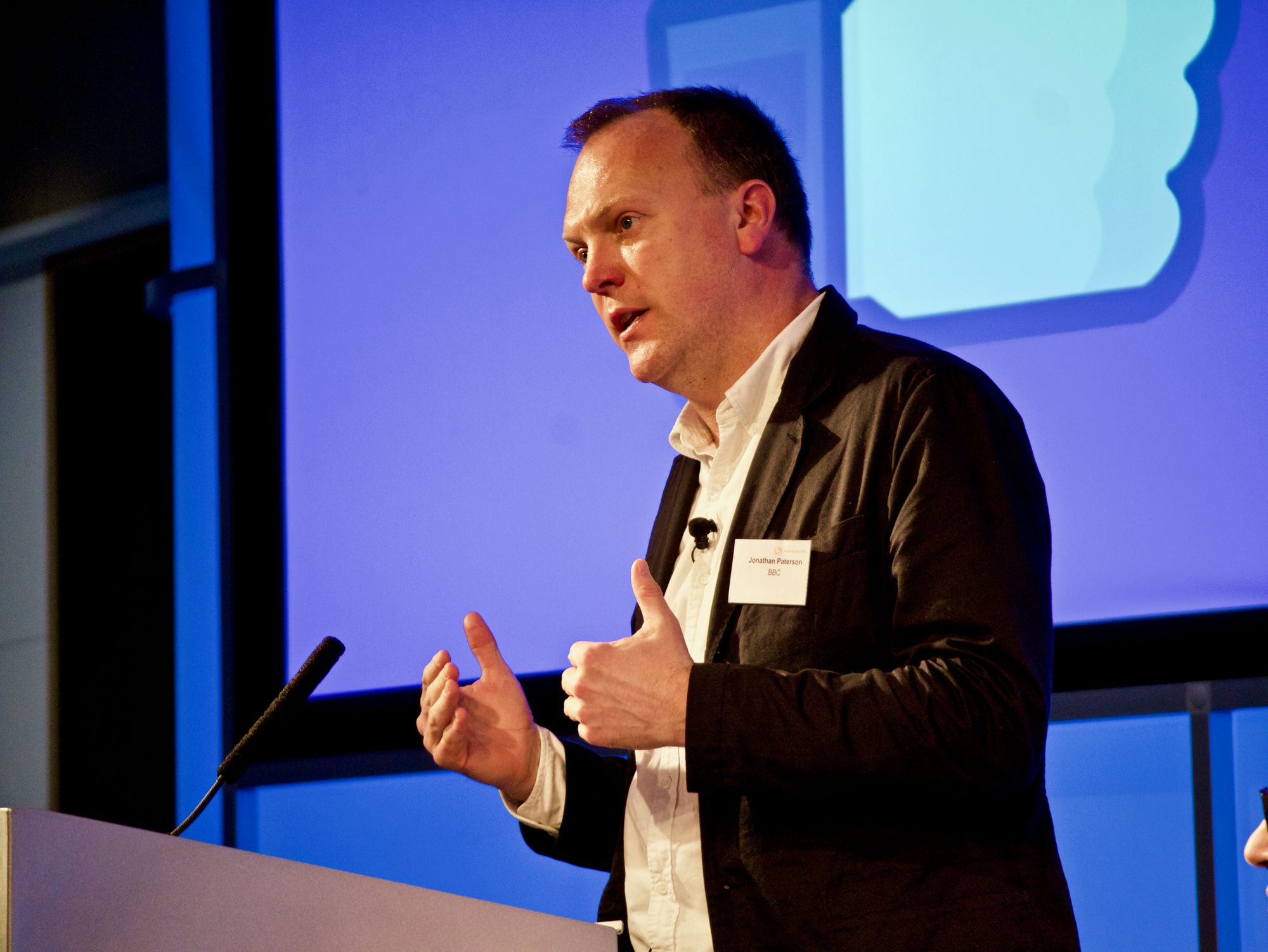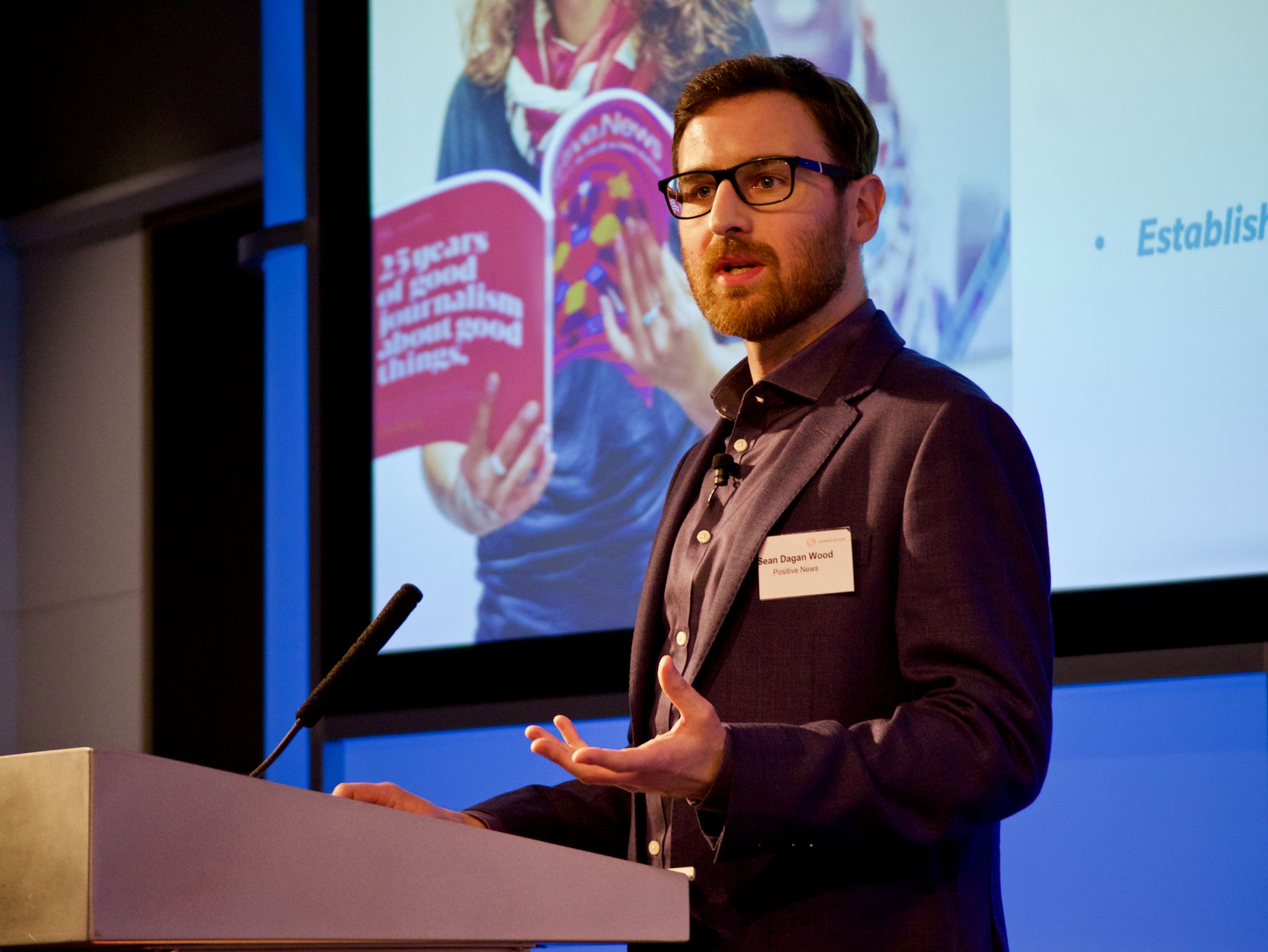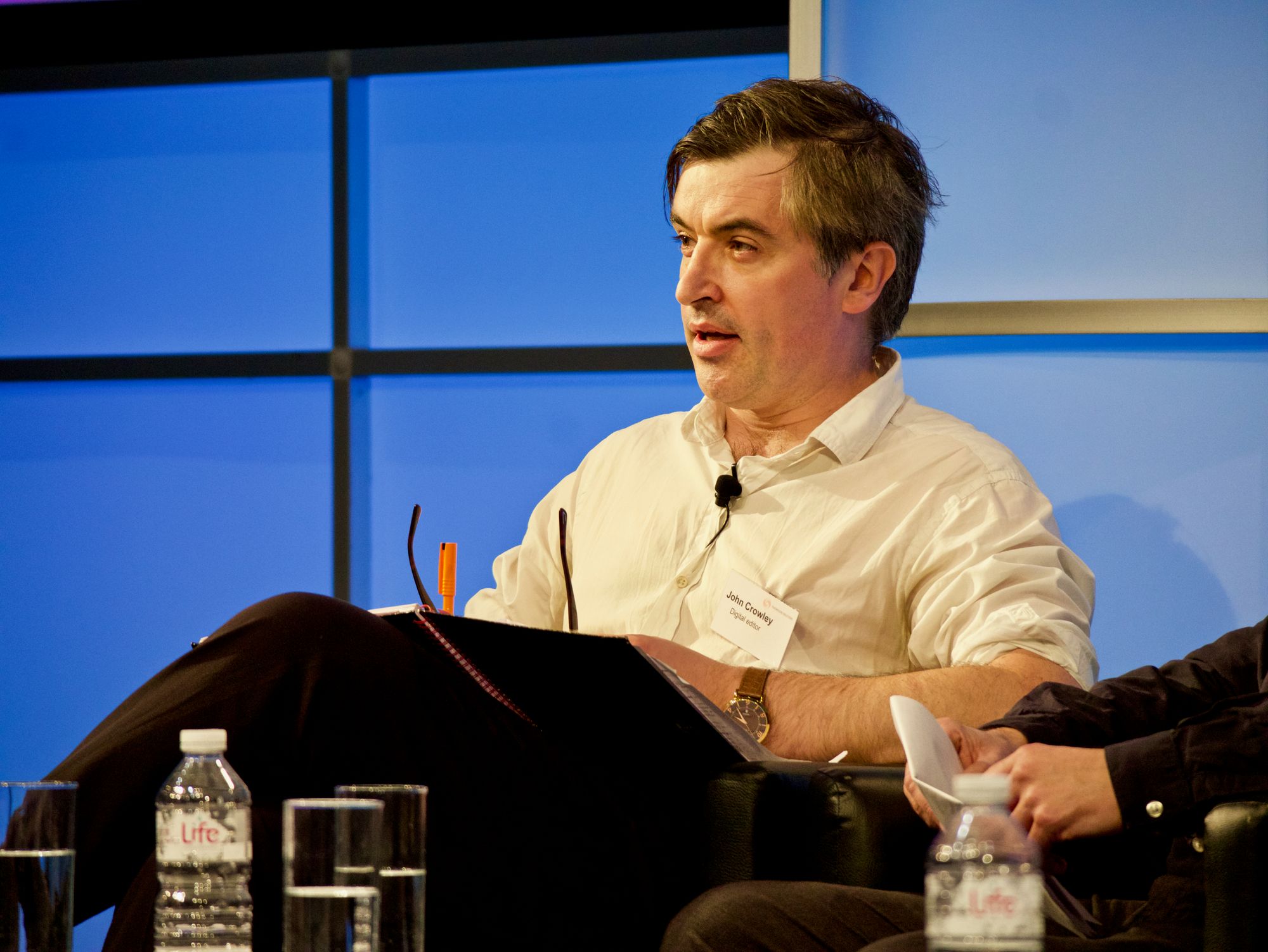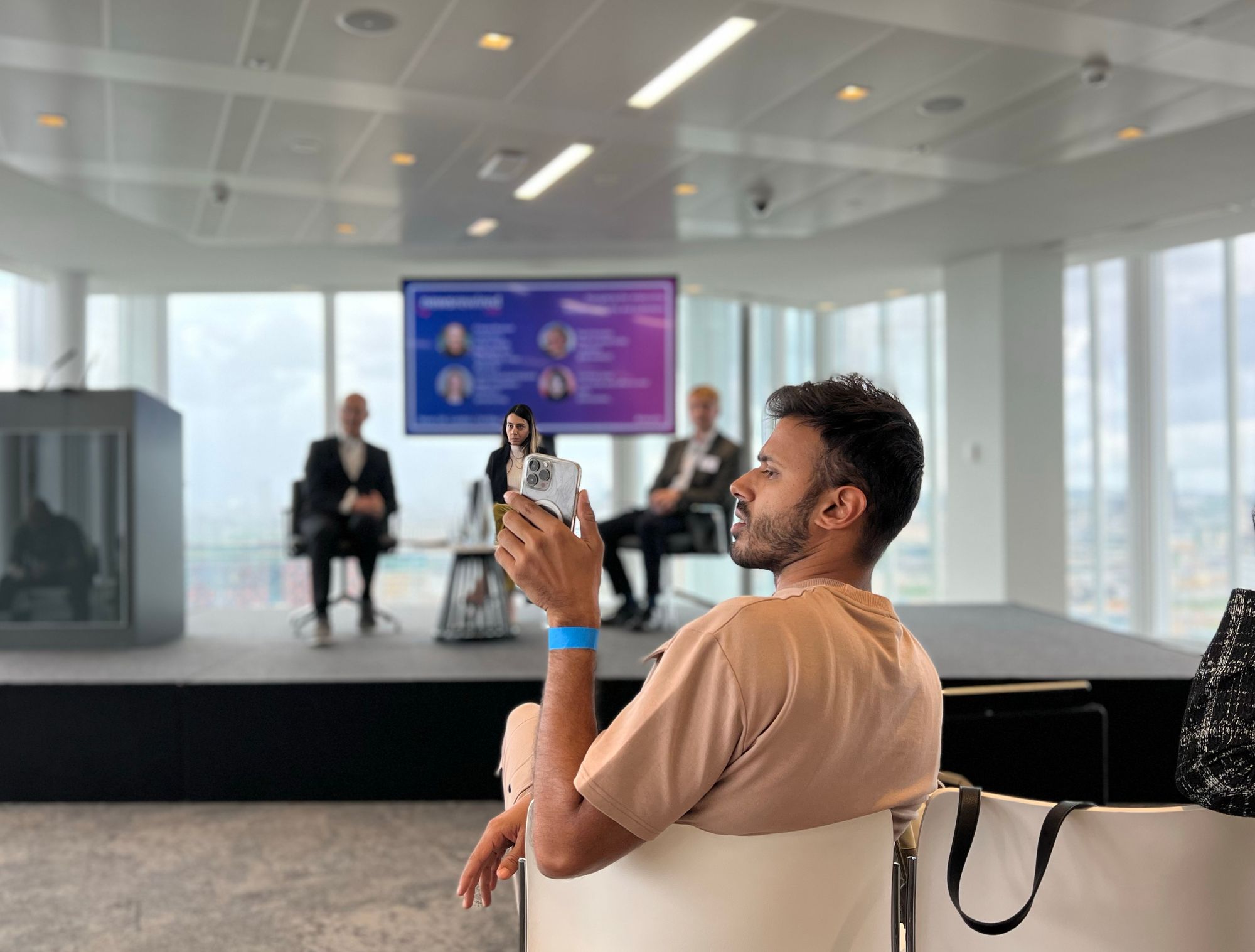
Solutions journalism: who is using it - and why
Can upbeat news which delivers solutions to our problem supplant "if it bleeds, it leads"? Maybe - it's certainly proved lucrative for some publishers.
An afternoon panel debate at the March 2019 news:rewired explored the reasons behind the growth in solutions journalism - and the possibility that it might bring us closer to our readers.
Panel
- Jonathan Paterson, editor, Digital Video, BBC News
- Aurore Malval, journalist, Nice Matin
- Jerome Whittingham, editor, Hull Is This
- Sean Dagan Wood, publisher, Positive News
- John Crowley, digital journalist and editor, moderating
Jerome Whittingham
Hull Is This

In 1994, in Hull, there were hundreds of photographers listed in the yellow pages. So Jerome — who had just moved there with his now ex-wife — decided to find a niche. He settled on community development. He produced materials for charities, non-profits and social enterprises. The clients wanted to be on TV or in the local newspaper. Now, the reverse is true. They don't want to be a clickbaity story on a website, or a "and finally" at the end of the news. They want to tell positive stories - about things that are working.
Could there be support for a constructive news website in the city?
Hull has benefitted from being the 2017 City of Culture. It has gone from a "crap town" to a tourist destination. Once we hit 2018, there was a sense that the city wanted to stay in the flickering limelight. And so, last November, he launched Hull Is This, a positive news website. But the impact of the website in the last few months has been quite remarkable. They've published 260 articles, submitted by the city's freelancers or others. Most stories are either exclusive, or first published on the site.
Other news media are running to catch up. Even Hull City Council has set up a good news website. Solutions-focused journalism is the vitamins - and the fibre - in people's diets. They're adding a patronage model, with 30 patrons so far.
A collective of freelancers, @hullisthis focuses on producing positive news and has demonstrated that there is an appetite for constructive news at the local level, what @photomoments called “the vitamins if not the fiber in people’s news diet.” #newsrw pic.twitter.com/jAyKX0x2wZ
— Joy Jenkins (@joyjenkins) March 6, 2019
Aurore Malval
Nice Matin

Nice Matin is a regional newspaper for two departments in France publishing about 600 articles a day, from 180 journalists. Solutions journalism is a small team of three journalists and a video-journalist. They produce very long reads, which are the keystone of their subscriber #MonJournal offer…
It's the 5 Ws with one addition: what are we doing now. They're looking for well-defined issues they can have an impact on. They announce the chosen topic via a Facebook Live. Once the readers choose the next topic, they'll produce between 10 and 15 articles, some in collaboration with the readers. After the investigation, they'll have a debate and a "making of" article explaining the difficulties and successes.
.@AMalval from the #solutionsjournalism team at Nice Matin in France on how they approach covering solutions journalism stories - key slides 2/2. Interesting that there's pushback from newsroom even though engagement & revenue both positively impacted. #newsrw pic.twitter.com/zcRSx4wnaZ
— 𝐂𝐨𝐫𝐢𝐧𝐧𝐞 𝐏𝐨𝐝𝐠𝐞𝐫📱🎓 (@corinne_podger) March 6, 2019
A good solutions journalism piece looks at one person's solution, including proofs of result, now points of view on the issue - and an examination of the limitations of the issue, to avoid slipping into an advertorial tone. Solutions journalism is not just "good news" journalism - it's more than that.
Great slide from @AMalval at #newsrw presentation on solutions journalism. pic.twitter.com/xnhrczbWGI
— Peter Stewart - voice & video (@TweeterStewart) March 6, 2019
Solutions journalism readers are over twice as likely as average article readers to subscribe.
The solutions journalism at @Nice_Matin has drawn 10,000 subscribers in 3 years - 32 months of gains - through focusing on going a step beyond classic investigative reporting, not producing advertorials or “feel-good news,” says @AMalval #newsrw pic.twitter.com/k4MT62zXYC
— Joy Jenkins (@joyjenkins) March 6, 2019
However, the idea is hard to sell to the rest of the staff. It's hard work to research solutions. The border with advertorial is a daily struggle - the "happy news" temptation is real.
Jonathan Paterson
BBC News

How do we deal with important, negative stories in the age of the Like button, when downbeat stories often don't spread? Focus on the solutions. Tell people how hospitals are making sure the right people come to accident and emergency:
The A&E with a nurse on the front doorHow 'gatekeeper' nurses are cutting waiting times in one A&E. (Via BBC Lifestyle & Health News) bbc.in/2FSl08u
Geplaatst door BBC News op Dinsdag 22 januari 2019
Show Norway's bottle deposit scheme:
Norway's plastic waste solution...Has Norway found a way to deal with their plastic waste problem? (BBC Science News)
Geplaatst door BBC News op Woensdag 7 februari 2018
They don't deny or ignore the problem - it's the starting point for the story. But they provide a new take - a solution. Sometimes the solution is the way into explaining the problem - like the community taxi service that highlights the bus cuts coming from austerity.
How do we develop a commissioning model that delivers solutions journalism like that?
Sean Dagan Wood
Positive News

Almost a third of people avoid the news because of the negative effects of it on mood. Positive News is a counter to that, online and in print. They make money form print, brand partnerships and memberships. They've been doing this for 15 years, but ran a crowdfunding campaign to make it a community-owned businesses. Print circulation has doubled, web visits are up by over 60% - and they're profitable for the first time since the relaunch.
.@SeanDaganWood of @PositiveNewsUK says the media industry has known that positive news resonates with audiences for a long time, but has taken a while to learn how to approach it. Here's their approach. #newsrw pic.twitter.com/lqJRYKPVcj
— 𝐂𝐨𝐫𝐢𝐧𝐧𝐞 𝐏𝐨𝐝𝐠𝐞𝐫📱🎓 (@corinne_podger) March 6, 2019
They aim to do rigorous, constructive journalism that moves society forwards.
- Inform: balances out the negativity bias
- Inspire: Improves mood, creates hope and optimism
- Involve: Change can happen, actions matter
If my mention of @PositiveNewsUK’s ‘community shares’ crowdfunding campaign caught your interest at #newsrw, here are some tips from me and others behind successful journalism crowdfunding projects: https://t.co/tYsafXnCaF via @stellavolkenand @ejcnet
— Seán Dagan Wood (@SeanDaganWood) March 6, 2019
Q&A

Q. We've heard this idea bandied around over the last year or so. Does it give you a rose-tinted view, a prozac-infused perspective?
Sean: Have a diverse media diet. Don't just read Positive News. You cna still cover negative facts within a solutions story.
Aurore: After the Paris shootings, we looked at how we rebuild the city after this event. But it was way too soon for us to do it. It wasn't solutions at that point. It can be a question of timing.
Q. Do you use any specific branding to highlight solutions journalism?
Jonathan: No, we don't. But we do have some positive strands, and you'll see more of these stories on social.
Jerome: Does it need to be flagged? It should be becoming more mainstream.
Q. What would be your tip for doing solutions journalism?
Sean: Find the positive mindset: what can make a change?
Jonathan: Our audiences are more informed than they ever were. How do we find new angles on existing stories - solutions journalism is one of those angles.
Aurore: Yes, it's about attitude.
Jerome: It's about breaking journalists' mindsets. Build it and they will come.
Thanks for the inspiring presentations at #newsrw. Particularly liked the affirmation that a solutions approach to news is most appealing to audiences. Our audience is always more engaged with positive stories that share best practice https://t.co/k91LxLDqkq
— Sarah Lydall (@SarahLydall) March 6, 2019
Sign up for e-mail updates
Join the newsletter to receive the latest posts in your inbox.










